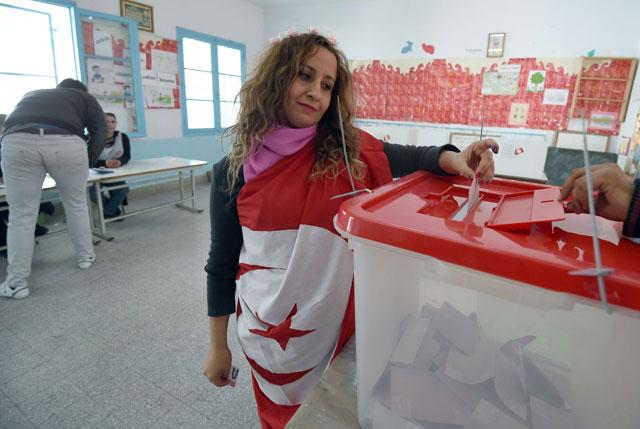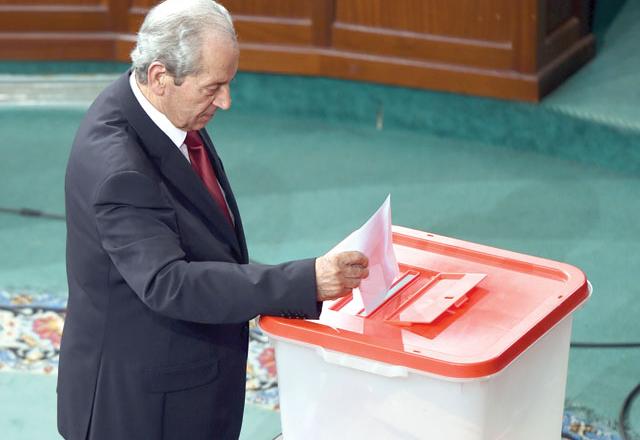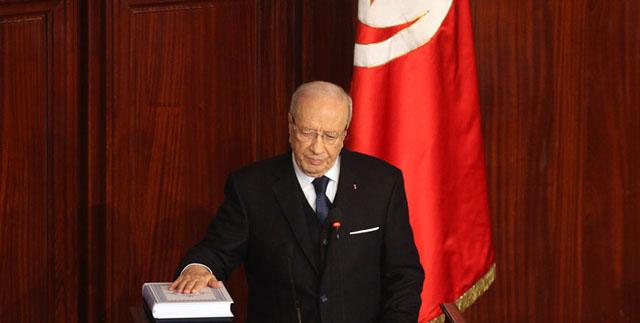You are here
Tunisia’s Essebsi campaign claims vote victory
By Reuters - Dec 21,2014 - Last updated at Dec 21,2014

TUNIS — Tunisian presidential candidate Beji Caid Essebsi claimed victory in Sunday's run-off election, which is seen as the final step to full democracy nearly four years after an uprising ousted autocrat Zine El Abidine Ben Ali.
Preliminary results were still to be released by election authorities, but soon after polls closed, Essebsi said he had beaten rival Moncef Marzouki, the incumbent president.
"I dedicate my victory to the martyrs of Tunisia. I thank Marzouki, and now we should work together without excluding anyone," Essebsi, a former parliament speaker under Ben Ali, told local television.
His campaign manager said "initial indications" showed the 88-year-old Essebsi had won without giving any details, as hundreds of celebrating supporters chanted "Beji President" and waved Tunisia's red and white national flag.
However, rival campaign manager for Marzouki, Adnen Monsar, dismissed the claims saying it was a very close call. "Nothing is confirmed so far," he told reporters.
With a new progressive constitution and a full parliament elected in October, Tunisia is hailed as an example of democratic change for a region still struggling with the aftermath of the 2011 Arab Spring revolts.
Tunisia avoided the bitter post-revolt divisions troubling Libya and Egypt, but tensions sporadically flare. One gunman was killed overnight and three arrested after they opened fire on a polling station in the central Kairouan governorate, a defence ministry official said.
Essebsi took 39 per cent of votes in the first round ballot in November with Marzouki winning 33 per cent.
As front runner, Essebsi dismissed critics who said victory for him would mark a return of the old regime stalwarts. He argued that he was the technocrat Tunisia needed following three messy years of an Islamist-led coalition government.
Marzouki, 69, is a former activist who once sought refuge in France during the Ben Ali era. He painted an Essebsi presidency as a setback for the “Jasmine Revolution” that forced the former leader to flee into exile.
“We need a president who looks after the people and is not interested only in power,” said Ibrahim Ktiti, an electrician who voted in the poor Ettadhamen neighbourhood of Tunis. “The old regime won’t make it back. Essebsi never excused himself for all the time he was with Ben Ali.”
Yet many Tunisians tie Marzouki’s own presidency to the Islamist party’s government and the mistakes opponents said it made in controlling the influence of hardline Islamists in one of the Arab world’s most secular countries.
Compromise has been important in Tunisian politics and Essebsi’s Nidaa Tounes Party reached a deal with the Islamist Ennahda Party to overcome a crisis triggered by the murder of two secular leaders last year.
Ennahda stepped down at the start of this year to make way for a technocrat transitional Cabinet until elections. But the Islamists remain a powerful force after winning the second largest number of seats in the new parliament.
Essebsi appeals to the more secular, liberal sections of Tunisian society, while analysts predicted that Marzouki would draw on support from more conservative rural areas, and from some members of Ennahda, which did not field a candidate.
The presidency post holds only limited powers over national defence and foreign policy. The parliament, led by Nidaa Tounes which won the most seats, will be key to selecting a prime minister to lead the government.
Related Articles
Tunisians vote on Sunday in a presidential election pitting an ex-official from the days of autocrat Zine El Abidine Ben Ali against a rights activist appealing to the spirit of the 2011 revolt that ousted him.
Tunisia’s first parliament since the 2011 revolution on Thursday elected veteran politician Mohamed Ennaceur, 80, of anti-Islamist party Nidaa Tounes as house speaker.
Anti-Islamist Beji Caid Essebsi, 88, was sworn in Wednesday as Tunisia's first freely elected president vowing to work for national reconciliation, four years after an uprising that sparked the Arab Spring.















